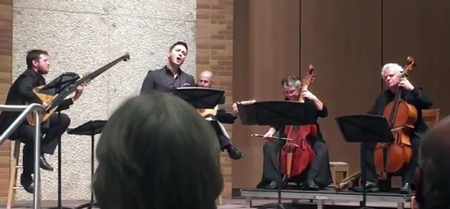by Timothy Robson

The original accompaniments were expanded to include an ensemble of two violins, two lute players (on various instruments), and two violists da gamba, all of whom are Apollo’s Fire regulars. The instrumentalists also interspersed dance movements by William Lawes that enhanced the storyline of Phan’s “pastiche song cycle.” There was not a weak moment in the 90-minute concert.
Phan constructed his cycle on the age-old theme of boy falls in love with girl, girl dumps boy, boy accepts death rather than life without the girl. A literal reading of the texts — included in the program book — supports this storyline, although some might argue that the lyricists wrote in more expansively metaphorical than literal terms.
A Painted Tale begins with a prologue, the song of the same name by Thomas Morley, its text about how untrustworthy love can be. Without pause, the instruments played (in the same key) Lawes’ Pavan in a from the Royal Consortt, Sett No. 7. Other songs dealt with the full range of expressions of love, from a youthful crush in Robert Johnson’s Have you seen but a bright Lily grow, to burning sexual desire in Nicholas Lanier’s Fire, Fire, a brilliant dramatic monologue:
Fire, fire, fire, fire, There is no hell to my desire.
Lawes’ Ecco, another movement from the Royal Consortt, featured the two violins in echoing patterns, supported by the viola da gamba with the Baroque guitar gently strumming the harmonies. Phan was at his best in Henry Purcell’s masterpieces Sweeter than Roses and She loves and confesses too. The tenor’s diction and legato elision of consonants to vowels was brilliant. He captured the musical and literary sense of each song so well that often printed texts were not necessary.
By the end of the first half of the program love had turned sour, as expressed in Lanier’s No more shall meads be deck’d with flowers. The second portion of the program opened with another stately Lawes Pavan, this time in C Major. It was the only instrumental selection on the second half, whose songs were considerably darker, focused on torment, guilt, and death.
John Blow’s Of all the torments, all the cares was striking in its florid vocal writing that abruptly switches gears to a slow, lyrical second section about the lover’s despair. In two of John Dowland’s classics, Now, O now I needs must part and, especially, Come, heavy sleep — accompanied by a solo viol to heart-rending effect — Phan portrayed the spurned lover facing death, although the cycle never explicitly reveals whether it is by his own hand or from natural causes due to loss of love. Lanier’s Stay, silly heart, and do not break ends with a reference to the lover’s tomb and his epitaph, “I died for love,” its austere viol accompaniment playing simple pizzicato notes.
Phan saved the best for last: Henry Purcell’s comforting Evening Hymn, with its radiant closing phrases of “Hallelujah,” gently accompanied by the full ensemble over a ground bass. Here was a group of artists fully in tune with their musical material. The Evening Hymn was itself worth the price of admission.
Nicholas Phan and the ensemble (Johanna Novom and Evan Few, violins, René Schiffer and Ann Marie Morgan, violas da gamba, William Simms and Charles Weaver, lutes) returned for an encore, in which the tenor put on his inner Whitney Houston for a ravishing rendition of Dolly Parton’s classic I Will Always Love You. It brought down the house.
Published on ClevelandClassical.com November 13, 2017.
Click here for a printable copy of this article


